The Timeline of Pre-Employment Drug Screening Explained
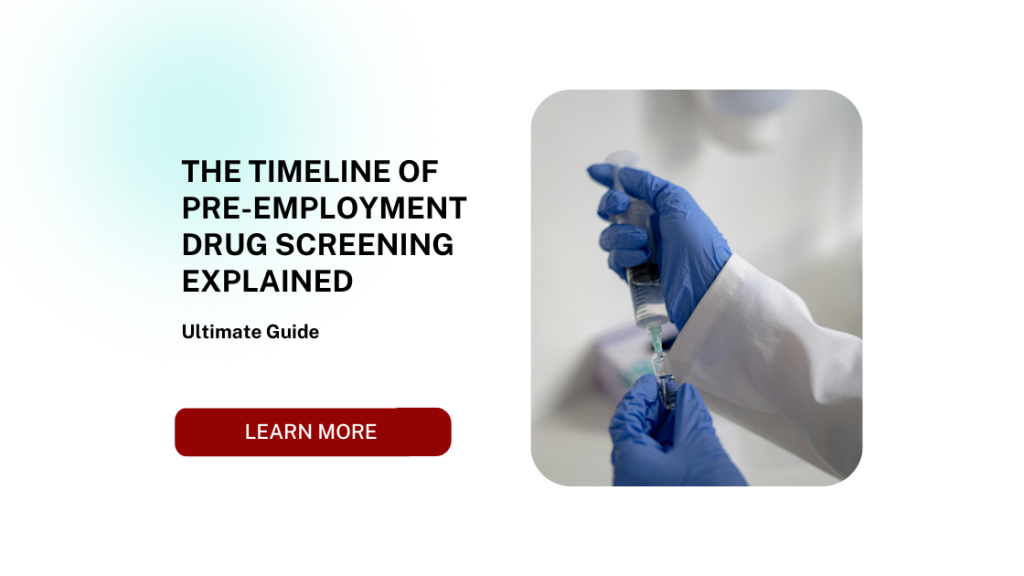
Understanding Pre-Employment Drug Screening: Process, Purpose, and Timeline
Pre-employment drug screening has become a cornerstone of hiring practices for many industries. By ensuring that potential hires are free from substance abuse, employers can protect their workforce, maintain safety, and comply with industry regulations. But how long does this process take? And what does it involve? This article explores the concept, purpose, and timeline of pre-employment drug screening, offering employers and job seekers a complete understanding of its significance.
What is Pre-Employment Drug Screening?
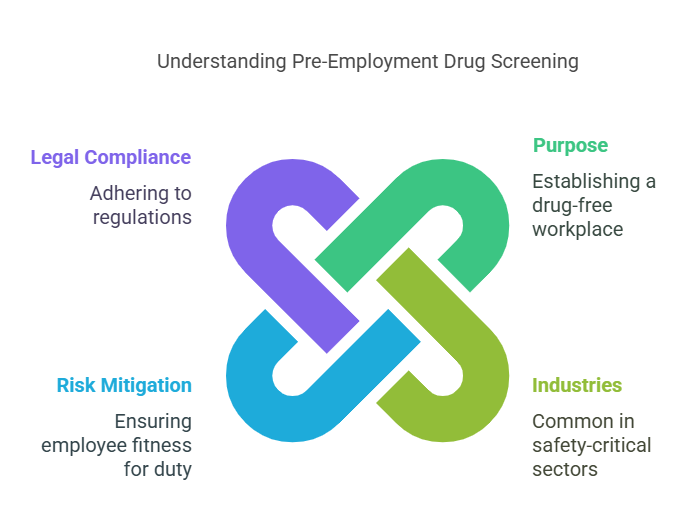
Pre-employment drug screening is a test employers conduct during the hiring process to determine whether a candidate is using illegal drugs or abusing prescription medications. The goal is to establish a drug-free workplace, promote safety, and adhere to legal and regulatory requirements.
This type of screening is particularly common in industries where safety is critical, such as transportation, healthcare, and manufacturing. Employers use it to mitigate risks and ensure that employees are fit to perform their job responsibilities.
How Does Pre-Employment Drug Screening Work?
The process of pre-employment drug screening typically involves the following steps:
- Candidate Notification: Employers inform candidates about the screening requirement and obtain their consent.
- Scheduling the Test: The candidate is scheduled to visit a testing facility or provide a sample for analysis.
- Sample Collection: A sample is collected for testing, which may include urine, hair, saliva, or blood.
- Laboratory Testing: The sample is analyzed in a lab to detect the presence of drugs or their metabolites.
- Results Reporting: The results are shared with the employer, and in some cases, with the candidate.
Factors That Affect the Duration of Pre-Employment Drug Screening
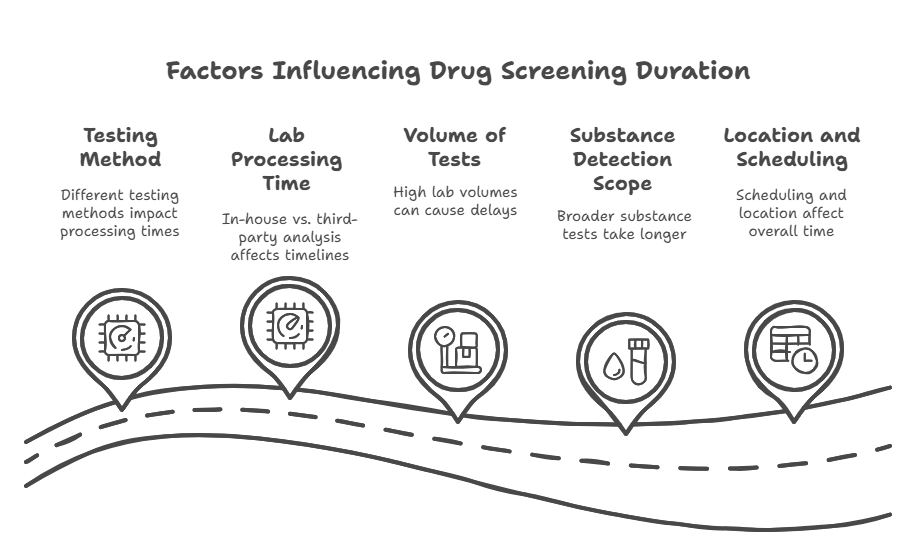
The time it takes to complete pre-employment drug screening can vary depending on several factors:
- Testing Method: Different methods, such as urine tests (the most common), hair follicle tests, or blood tests, have varying processing times.
- Lab Processing Time: Whether the sample is analyzed in-house or sent to a third-party lab can impact the timeline.
- Volume of Tests: High testing volumes at the lab, particularly during peak hiring seasons, can cause delays.
- Substance Detection Scope: Comprehensive tests that screen for a wider range of substances may take longer to process.
- Location and Scheduling: The time needed to schedule the test and for the candidate to visit the testing facility also affects the overall timeline.
Why Do Employers Require Pre-Employment Drug Screening?
- Workplace Safety: Employees under the influence of drugs may pose safety risks to themselves and others, especially in high-stakes industries like construction or transportation.
- Legal Compliance: Certain industries are mandated by law or federal regulations (e.g., DOT regulations) to conduct drug testing for all new hires.
- Reduced Liability: Drug-free employees are less likely to cause workplace accidents or engage in negligent behavior, reducing employer liability.
- Improved Productivity: Drug abuse can lead to absenteeism, reduced work performance, and increased turnover. Drug testing helps employers identify reliable candidates.
How Long Does Pre-Employment Drug Screening Take?
The timeline for pre-employment drug screening varies based on the factors mentioned earlier, but a general breakdown is as follows:
- Urine Tests: Results typically take 24-72 hours if no complications arise.
- Hair Follicle Tests: These tests may take 3-5 business days due to more complex analysis.
- Saliva Tests: Often processed faster, with results available within 24-48 hours.
- Blood Tests: Results are generally available within 1-3 days.
While these timelines represent average durations, delays can occur if retesting or further analysis is required.
Key Takeaways
Pre-employment drug screening is a vital tool for employers to ensure workplace safety, legal compliance, and a productive workforce. The process involves notifying candidates, collecting samples, and analyzing them in certified labs, with the timeline depending on the test type and lab efficiency. Understanding the purpose and factors affecting drug testing duration can help employers plan more effectively and set realistic expectations for their hiring process.
Steps in the Pre-Employment Drug Screening Process
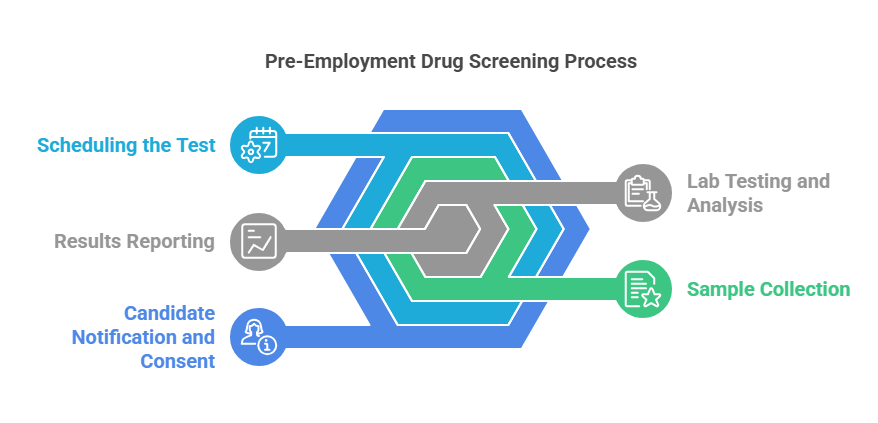
The pre-employment drug screening process consists of several key steps, each playing a crucial role in ensuring accurate and reliable results. Below is a breakdown of the process and the average time each step typically takes:
- Candidate Notification and Consent
- Timeframe: 1-2 business days
- Employers inform candidates of the requirement for drug screening and obtain their written consent. Transparency is crucial to avoid legal and ethical issues.
- Scheduling the Test
- Timeframe: Same day to 2 business days
- The candidate is scheduled to visit a testing facility or clinic to provide their sample. In some cases, at-home test kits may be mailed to the candidate.
- Sample Collection
- Timeframe: 15-30 minutes (depending on the method)
- The candidate provides a sample, such as urine, saliva, blood, or hair. Proper protocols are followed to ensure sample integrity and avoid contamination.
- Lab Testing and Analysis
- Timeframe: 1-5 business days
- The sample is sent to a certified lab for analysis. Testing time varies based on the method and substances being screened.
- Results Reporting
- Timeframe: 24-72 hours after lab testing is complete
- Results are reviewed and shared with the employer. Positive results may undergo additional confirmation testing, extending the timeline.
How Long Does Pre-Employment Drug Screening Take on Average?
The time it takes for pre-employment drug screening depends on the testing method and the complexity of the analysis. Below is an overview of the average timelines for the most common types of drug tests:
| Drug Test Type | Average Time to Results | Notes |
|---|---|---|
| Urine Test | 24-72 hours | Most common method; quick and cost-effective. |
| Saliva Test | 24-48 hours | Popular for its non-invasive collection process. |
| Hair Follicle Test | 3-5 business days | Detects long-term drug use but requires more processing time. |
| Blood Test | 1-3 business days | Used in specific scenarios; less common due to its invasive nature. |
| Instant Test Kits | Immediate to 1 day | May require confirmation testing at a lab for non-negative results. |
Factors That Influence Drug Screening Timeliness
Several variables can affect the duration of pre-employment drug screening. Understanding these factors helps both employers and candidates manage expectations:
- Testing Method
- Urine Tests: Generally the fastest, especially for detecting recent drug use.
- Hair Follicle Tests: Require more analysis and preparation, resulting in longer processing times.
- Lab vs. Instant Testing
- Lab Testing: More comprehensive but involves shipping time and lab analysis.
- Instant Testing: Provides immediate preliminary results but requires lab confirmation for non-negative outcomes.
- Volume of Tests
- High volumes during peak hiring seasons can create backlogs at testing facilities and delay results.
- Substance Detection Scope
- Comprehensive panels testing for multiple substances may take longer than basic tests.
- Geographical Location
- Access to nearby certified labs or collection centers impacts turnaround time.
- Compliance Checks and Retests
- Discrepancies, sample contamination, or tampering suspicions may require additional testing, increasing delays.
Common Reasons for Delays in Drug Screening Results
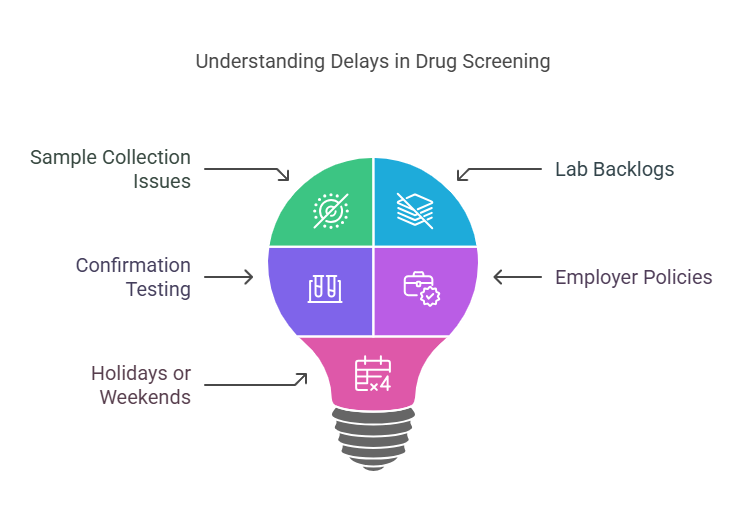
Occasionally, pre-employment drug screenings take longer than expected. Here are some common reasons for delays:
- Sample Collection Issues
- Problems such as insufficient sample volume, contamination, or improper labeling can require a retest.
- Lab Backlogs
- High demand during busy hiring periods may slow down processing times.
- Confirmation Testing
- Positive or inconclusive results may require further confirmation, extending the timeline by several days.
- Employer Policies
- Some employers implement additional steps, such as reviewing results internally or consulting medical review officers (MROs).
- Holidays or Weekends
- Samples collected late in the week may not be processed until the following business day.
How Precise Hire Can Help Employers
Employers looking to streamline their pre-employment drug screening process can benefit from partnering with professional services like Precise Hire. Here’s how Precise Hire makes the process efficient and reliable:
- Certified Lab Network
- Access to a nationwide network of certified labs ensures timely sample collection and analysis.
- Comprehensive Testing Panels
- Employers can choose from a variety of testing options tailored to their industry needs.
- Real-Time Updates
- Precise Hire offers tracking tools that provide real-time updates on the status of drug screening results.
- Compliance Assistance
- Guidance on adhering to state and federal regulations ensures legal and ethical testing practices.
- Reduced Turnaround Times
- By leveraging technology and streamlined processes, Precise Hire minimizes delays and delivers results quickly.
Legal Aspects of Pre-Employment Drug Screening
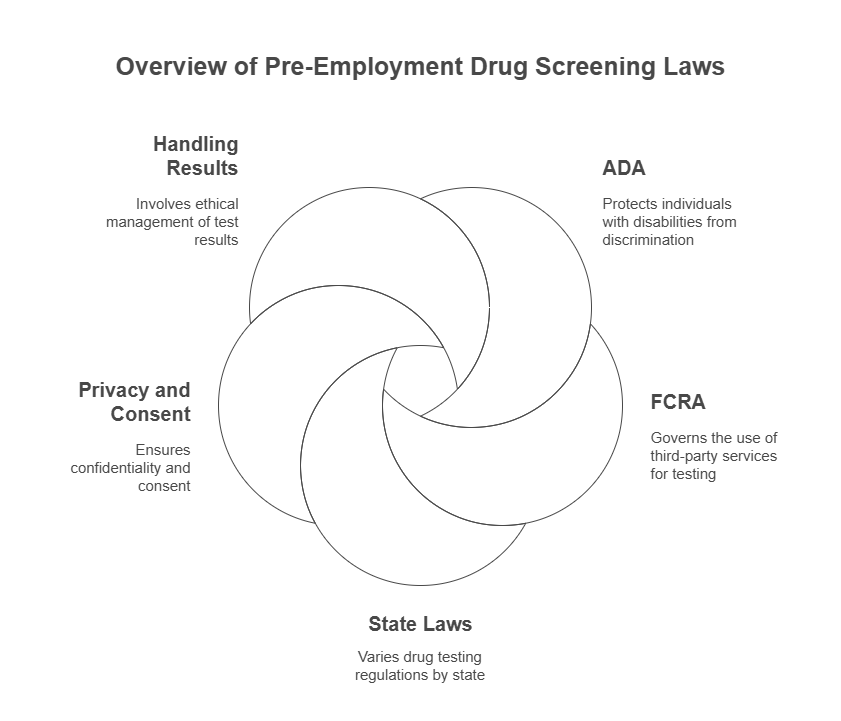
Drug testing in the hiring process must adhere to a variety of legal regulations to ensure fairness, privacy, and compliance. Below are the key legal considerations for pre-employment drug screening:
1. The Americans with Disabilities Act (ADA)
- The ADA prohibits discrimination against individuals with disabilities, including those recovering from substance abuse.
- Employers cannot ask candidates about past substance abuse treatment during the hiring process.
- However, current illegal drug use is not protected under the ADA, and pre-employment drug screening is permissible.
2. The Fair Credit Reporting Act (FCRA)
- The FCRA applies when an employer uses a third-party service to conduct drug testing.
- Employer Obligations Under the FCRA:
- Notify the candidate in writing about the drug screening and obtain their consent.
- Provide a pre-adverse action notice if the results negatively impact the hiring decision.
- Share a copy of the drug test results with the candidate if requested.
3. State-Specific Drug Testing Laws
- Drug testing laws vary by state, and some states impose stricter requirements on when and how testing can occur.
- Examples:
- California: Requires employers to demonstrate a clear business necessity for drug testing.
- New York: Prohibits testing for cannabis use unless the role is safety-sensitive.
- Examples:
- Employers should review state-specific laws to avoid legal complications.
4. Privacy and Consent
- Candidate Consent: Employers must obtain written consent before conducting a drug test.
- Privacy Rights: Employers must ensure that drug testing is conducted discreetly and results are kept confidential.
5. Handling Positive Results and Retesting
- Employers must follow legal and ethical practices when handling positive test results.
- Steps to take:
- Confirm the results through additional testing if necessary.
- Consult with a Medical Review Officer (MRO) to validate the findings.
- Provide candidates with an opportunity to explain or contest the results.
Common Mistakes Employers Make with Drug Screening
To maintain a fair and compliant hiring process, employers should avoid these common pitfalls:
- Failing to Notify Candidates
- Some employers skip the step of providing clear notice and obtaining written consent, which is legally required under FCRA.
- Improper Record-Keeping
- Employers must securely store test results to protect candidate privacy and meet compliance requirements.
- Lack of a Written Policy
- A clear, documented drug testing policy ensures consistency and reduces the risk of legal disputes.
- Testing for Non-Relevant Substances
- Employers should only screen for substances that are relevant to the job or industry.
- Ignoring State-Specific Laws
- Overlooking state regulations can lead to fines or legal challenges.
FAQs About Pre-Employment Drug Screening
Below are answers to frequently asked questions about the drug testing process:
How long do pre-employment drug screening results take to come back?
The timeline depends on the test method:
-
- Urine and saliva tests: 1-3 business days.
- Hair follicle tests: 3-5 business days.
- Instant tests: Immediate to 1 day, with potential lab confirmation for non-negative results.
Can drug screening results delay my job offer?
Yes, delays can occur due to lab backlogs, confirmation testing, or administrative errors. Employers should communicate clearly with candidates about expected timelines.
What happens if I fail a pre-employment drug test?
Failing a drug test may result in the withdrawal of a job offer. However, employers are encouraged to provide candidates with an opportunity to explain the results and ensure decisions comply with legal guidelines.
Are there any ways to speed up the drug screening process?
Employers can expedite the process by:
-
- Partnering with professional services like Precise Hire for streamlined testing.
- Choosing fast-testing methods, such as saliva or instant kits.
- Scheduling tests promptly and avoiding peak hiring seasons.
Can pre-employment drug screening results affect my job prospects?
Yes, results may impact your eligibility if the test reveals substance use that is incompatible with the role or violates workplace policies.
How long do pre-employment drug screening results take to come back?
The timeline depends on the test method:
-
- Urine and saliva tests: 1-3 business days.
- Hair follicle tests: 3-5 business days.
- Instant tests: Immediate to 1 day, with potential lab confirmation for non-negative results.
Can drug screening results delay my job offer?
Yes, delays can occur due to lab backlogs, confirmation testing, or administrative errors. Employers should communicate clearly with candidates about expected timelines.
What happens if I fail a pre-employment drug test?
Failing a drug test may result in the withdrawal of a job offer. However, employers are encouraged to provide candidates with an opportunity to explain the results and ensure decisions comply with legal guidelines.
Are there any ways to speed up the drug screening process?
Employers can expedite the process by:
-
- Partnering with professional services like Precise Hire for streamlined testing.
- Choosing fast-testing methods, such as saliva or instant kits.
- Scheduling tests promptly and avoiding peak hiring seasons.
Can pre-employment drug screening results affect my job prospects?
Yes, results may impact your eligibility if the test reveals substance use that is incompatible with the role or violates workplace policies.
Best Practices for Employers
To ensure a smooth and compliant drug screening process, employers should follow these best practices:
- Develop a Clear Policy
- Outline the purpose of drug testing, the substances tested, and the consequences of a failed test.
- Stay Informed of Legal Requirements
- Regularly review federal and state laws governing drug testing to maintain compliance.
- Partner with Reliable Providers
- Use trusted services like Precise Hire to ensure accurate, timely, and compliant drug screenings.
- Communicate Transparently
- Keep candidates informed about the drug testing process, including timelines and expectations.
- Ensure Confidentiality
- Protect the privacy of candidates by securely storing test results and limiting access to authorized personnel.
Conclusion
Pre-employment drug screening plays a vital role in maintaining workplace safety, compliance, and productivity. Understanding the process, timelines, and legal considerations is essential for both employers and job candidates. Employers can avoid common pitfalls by implementing clear policies, adhering to legal guidelines, and partnering with professional providers like Precise Hire for efficient and reliable drug testing services.
